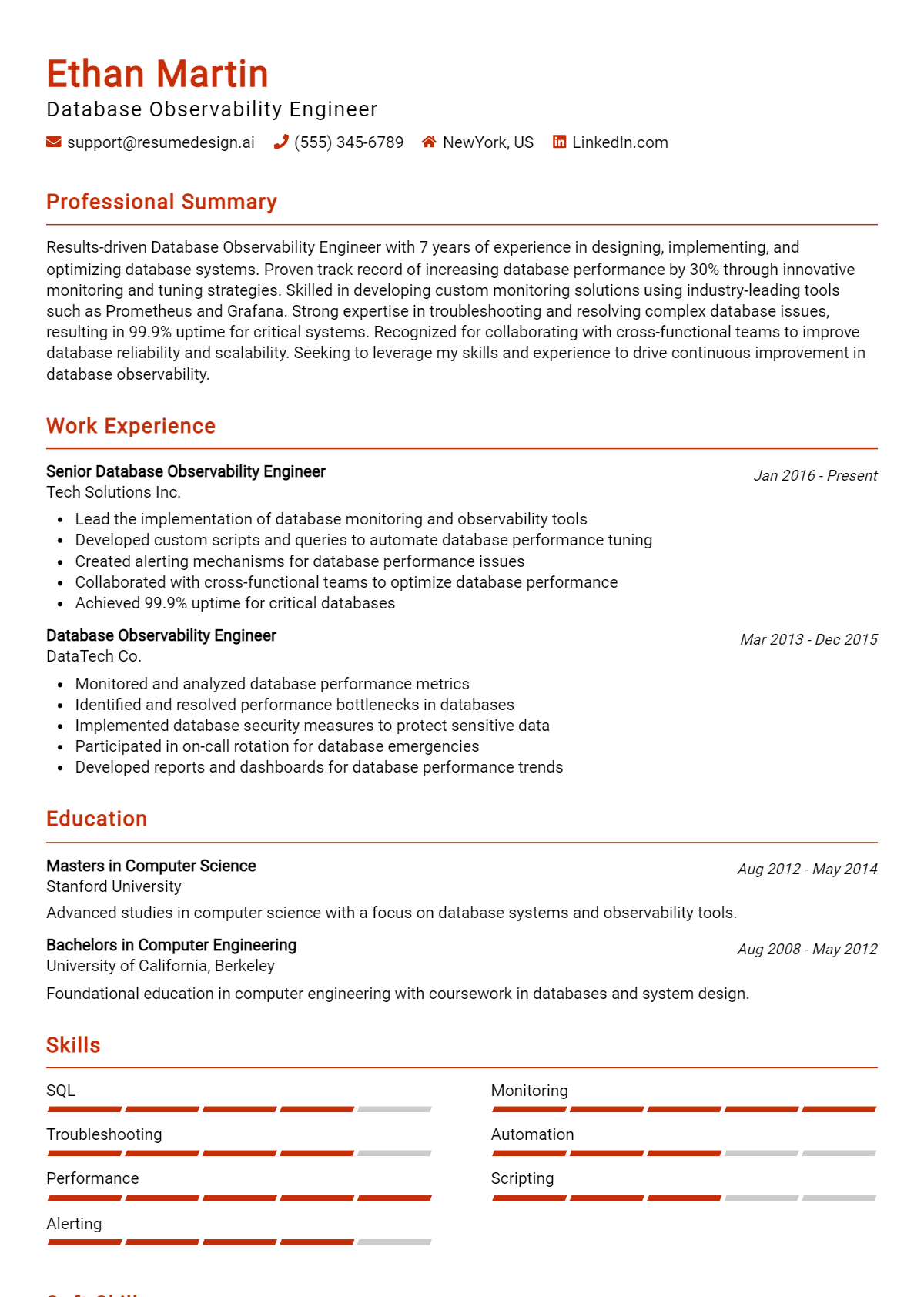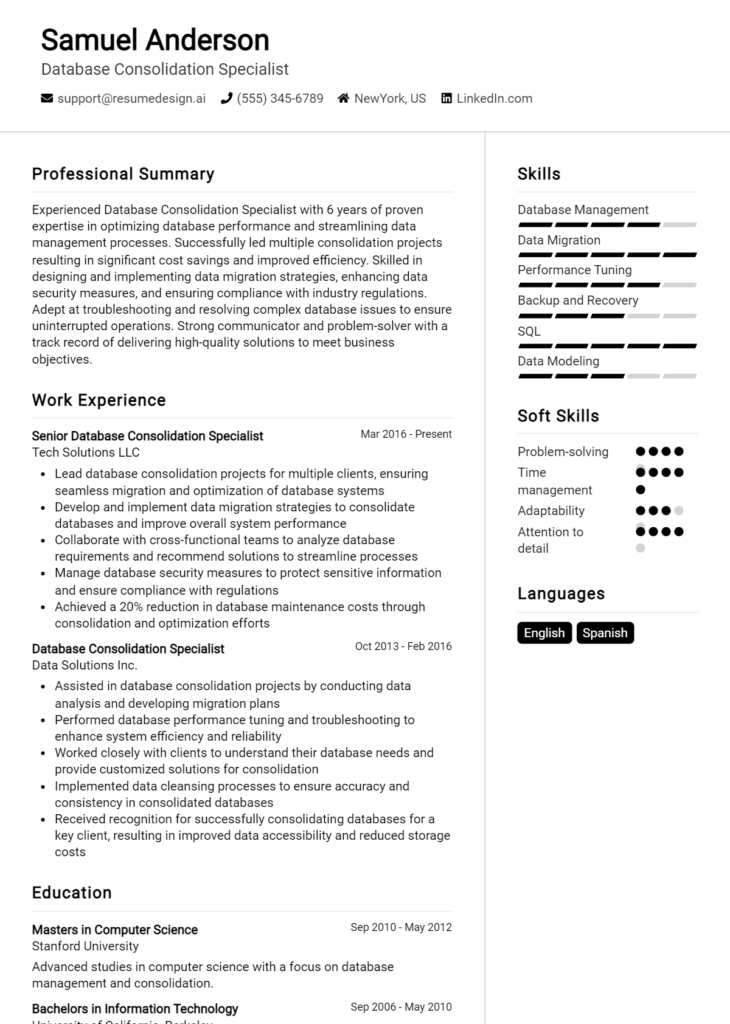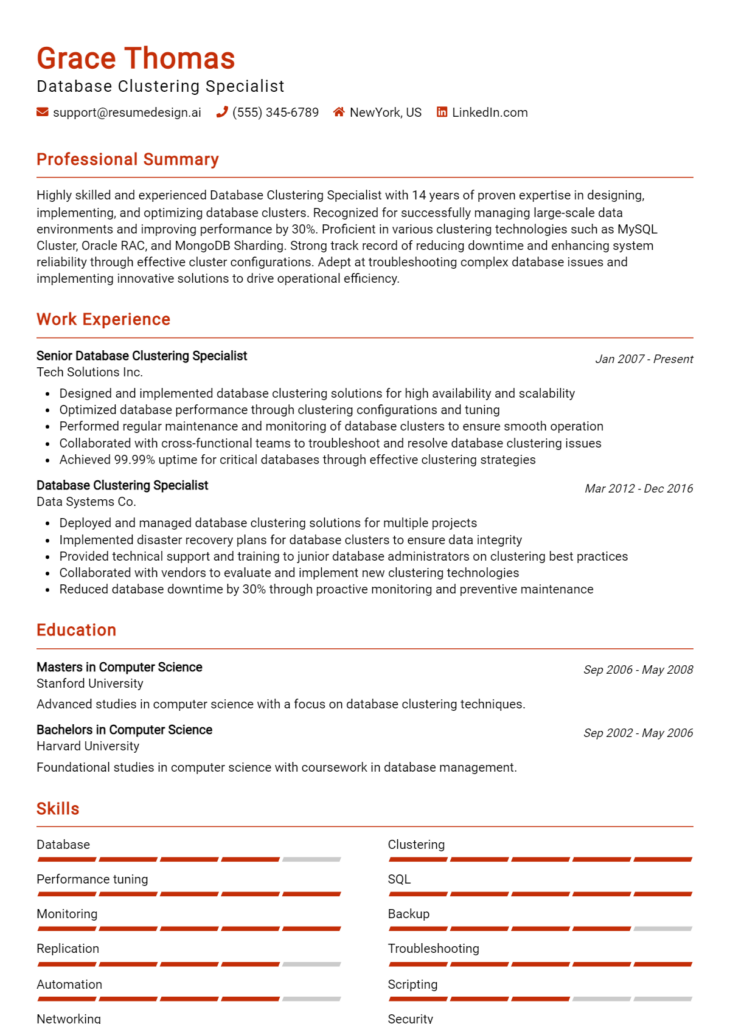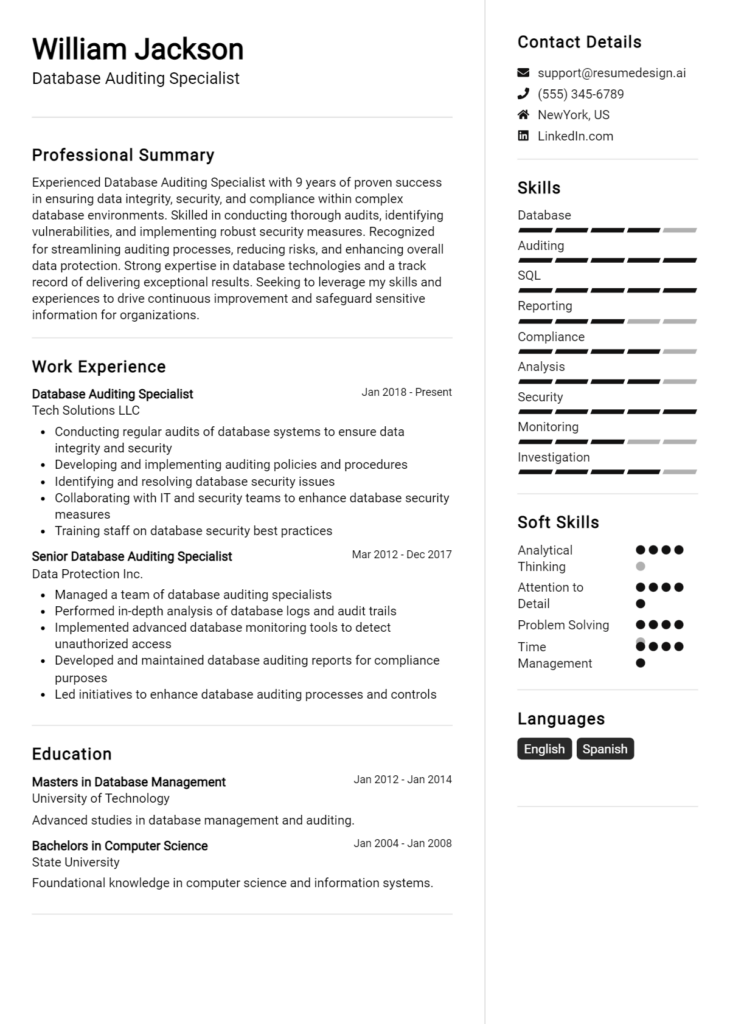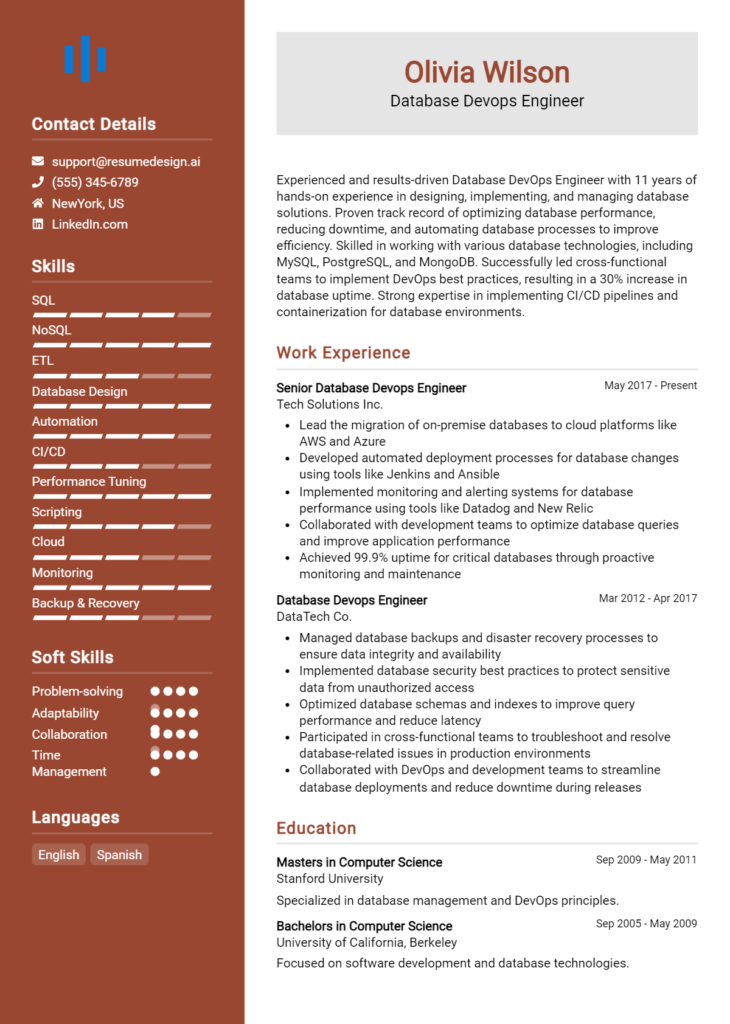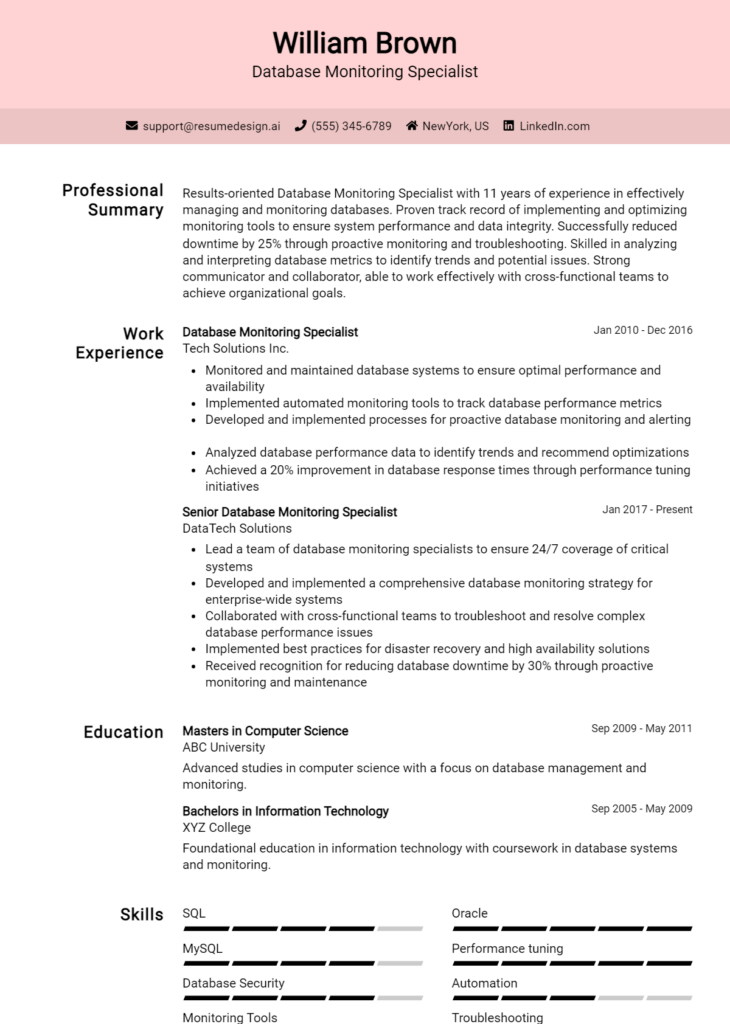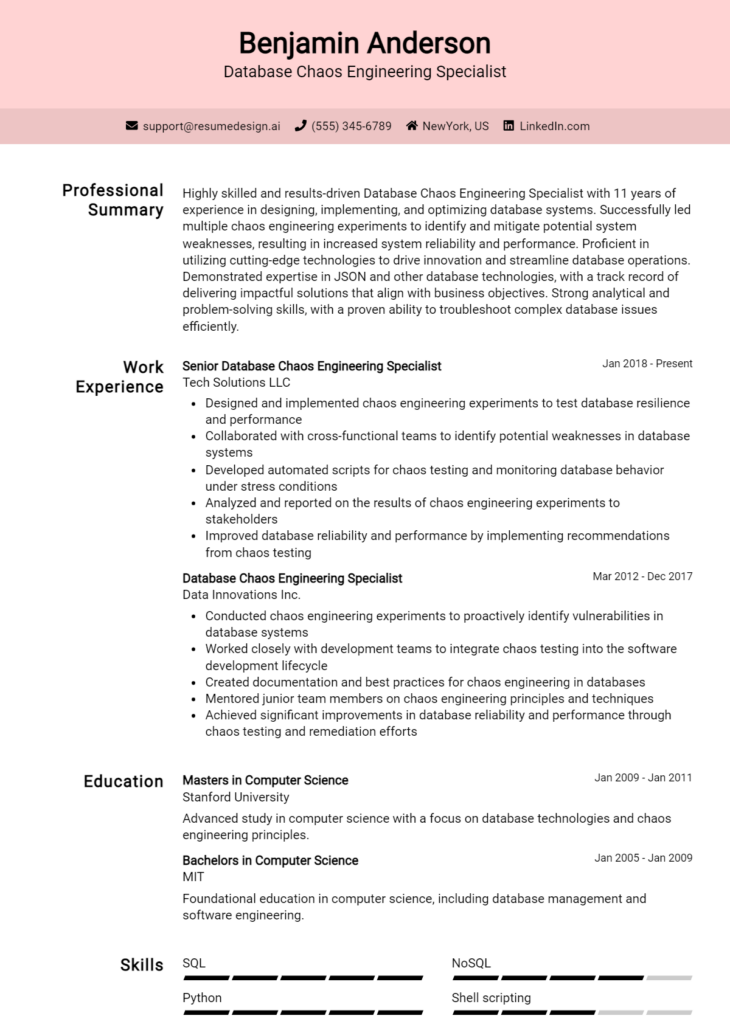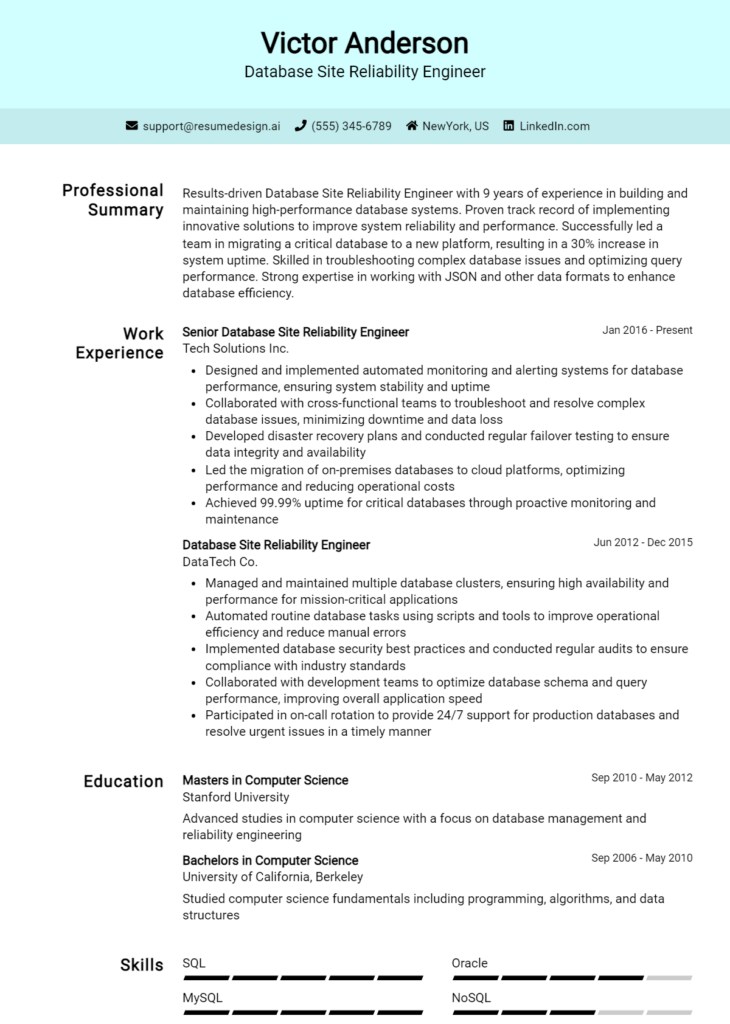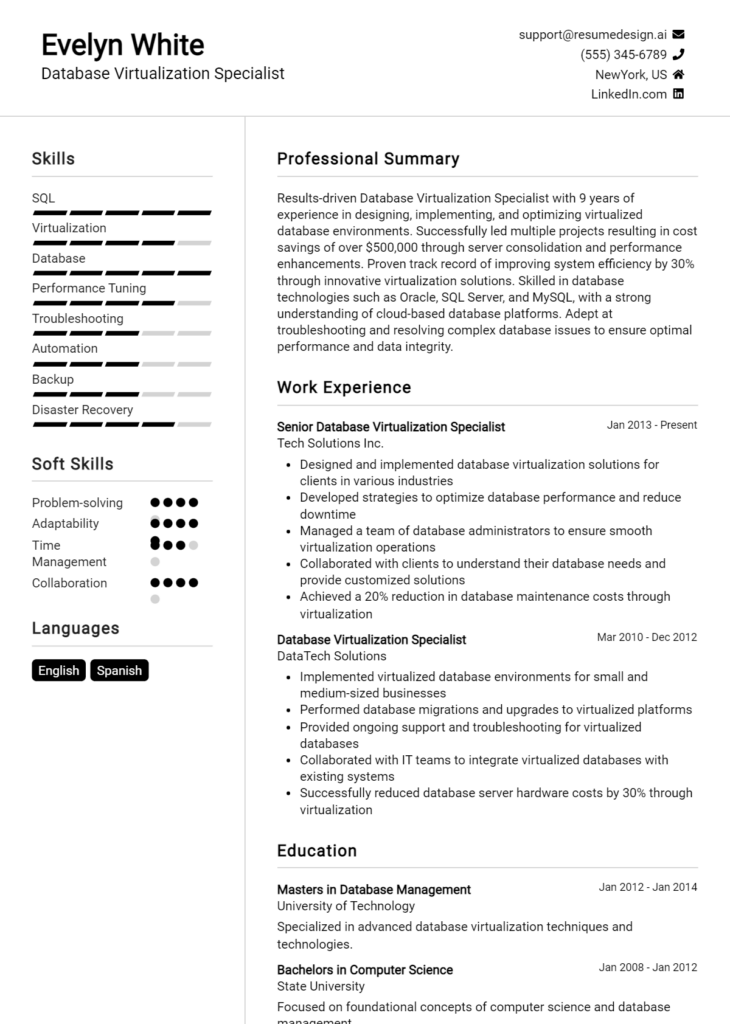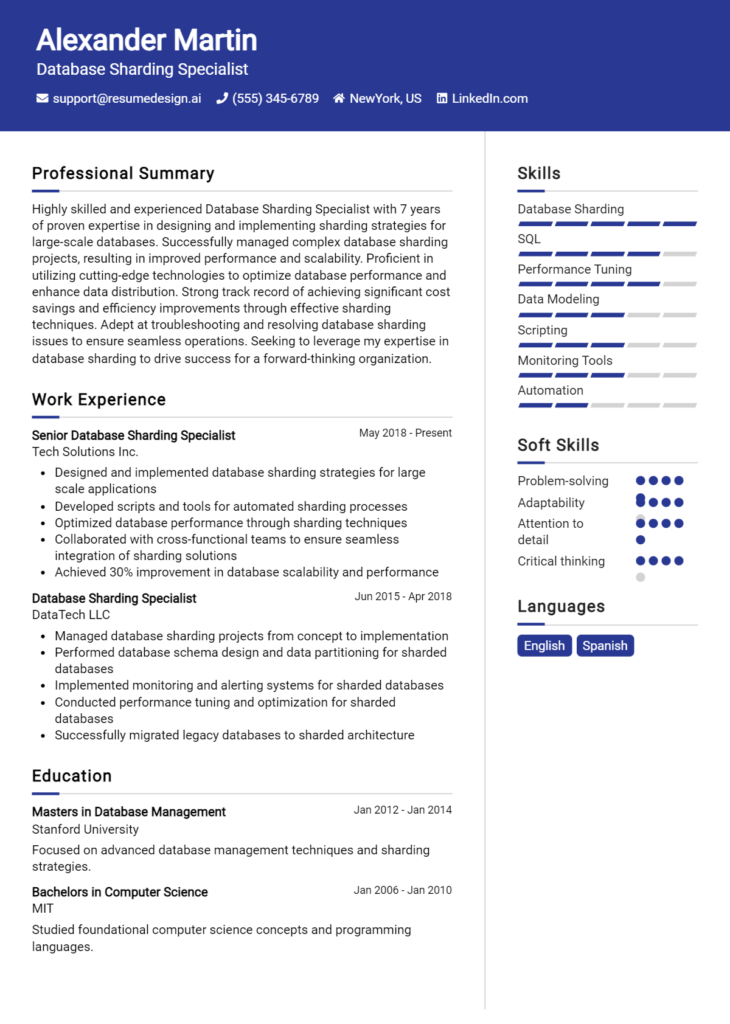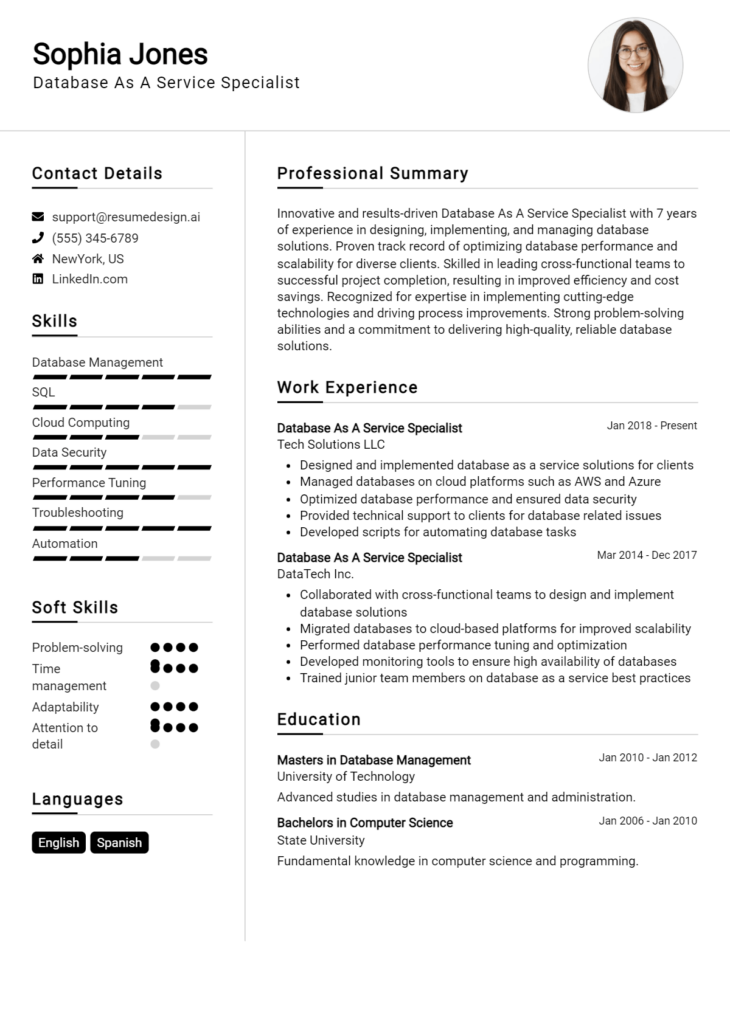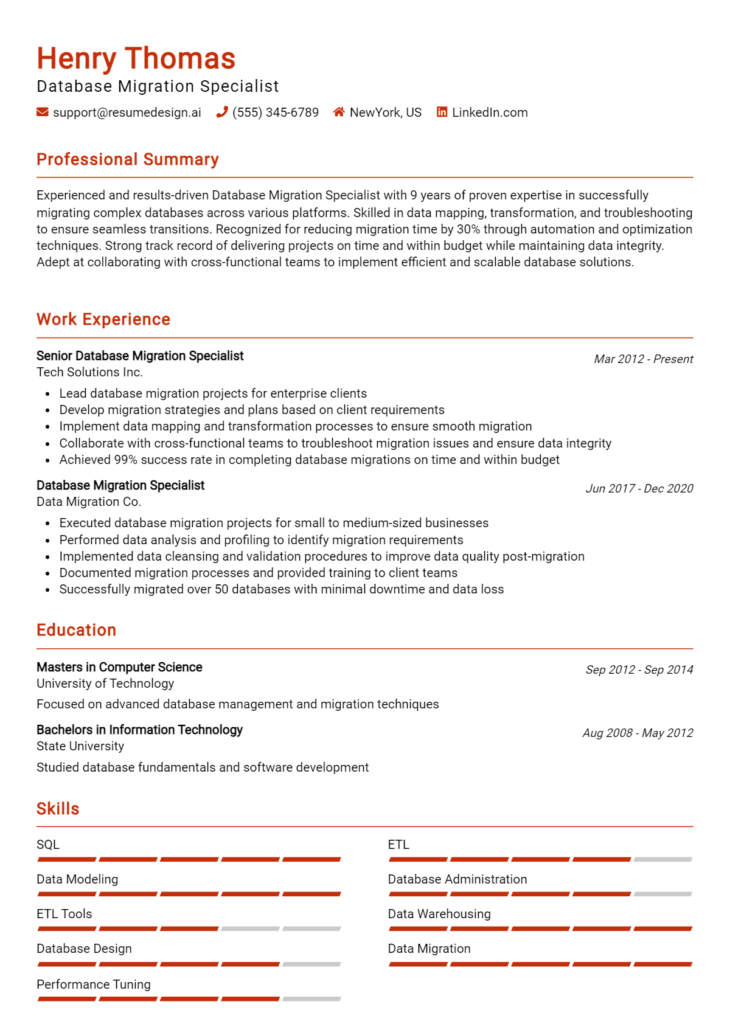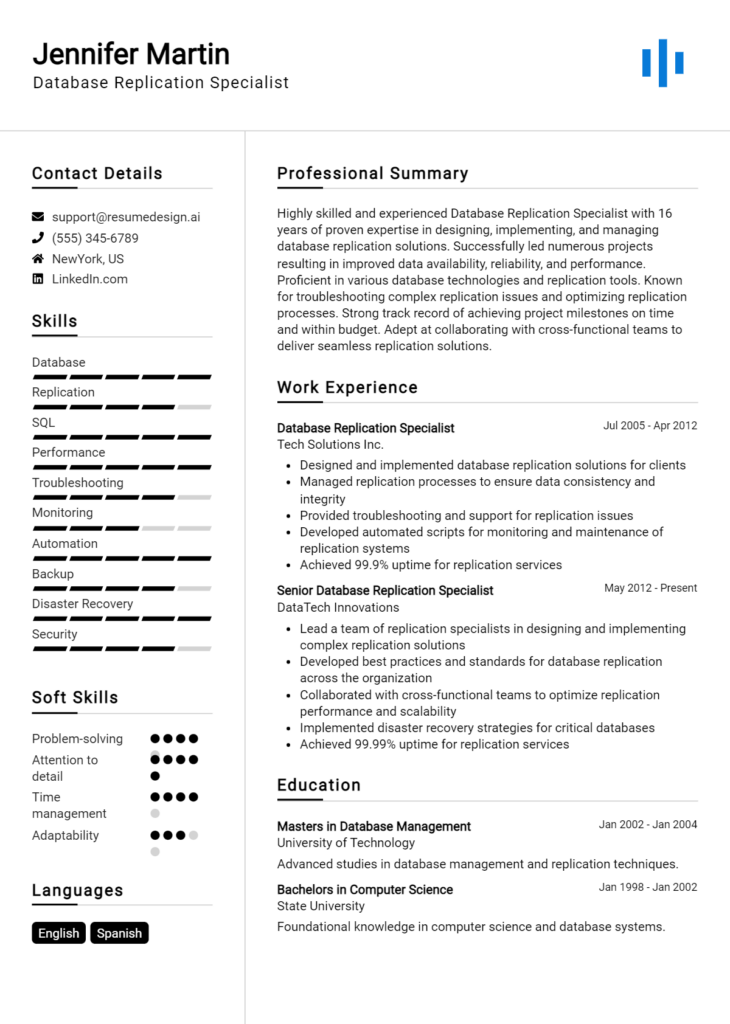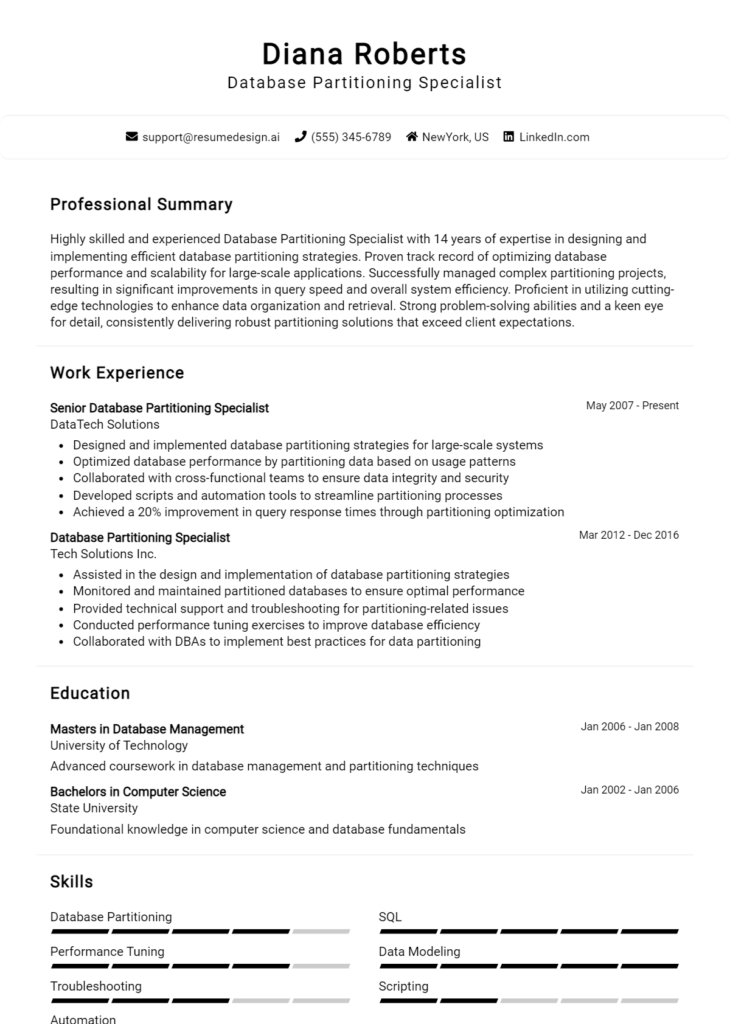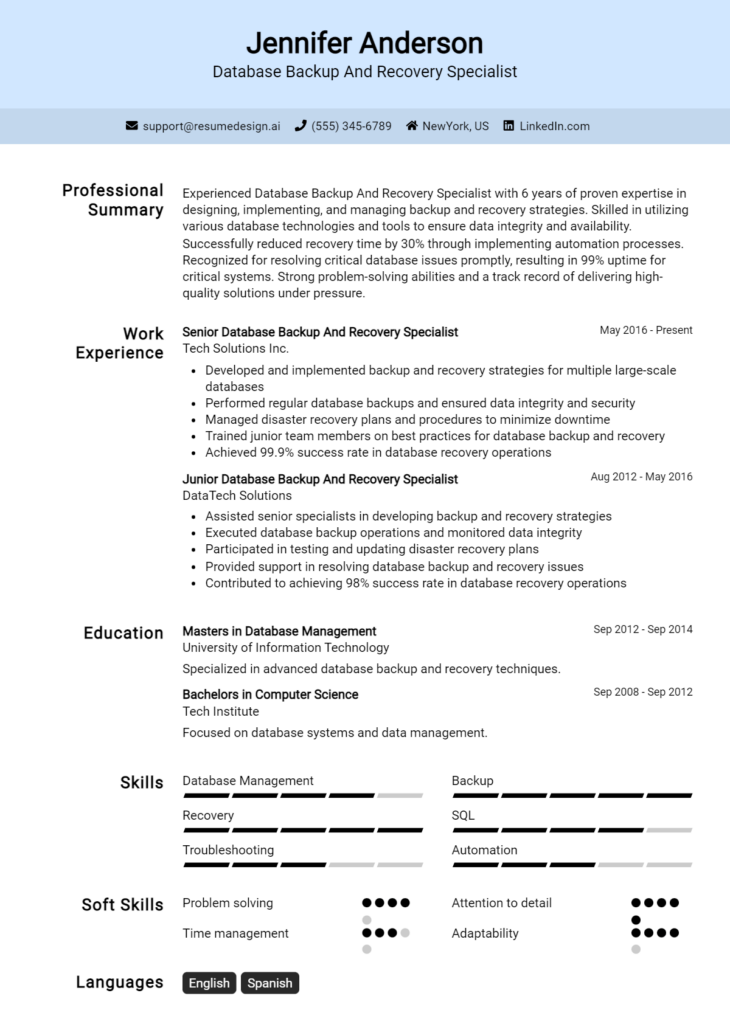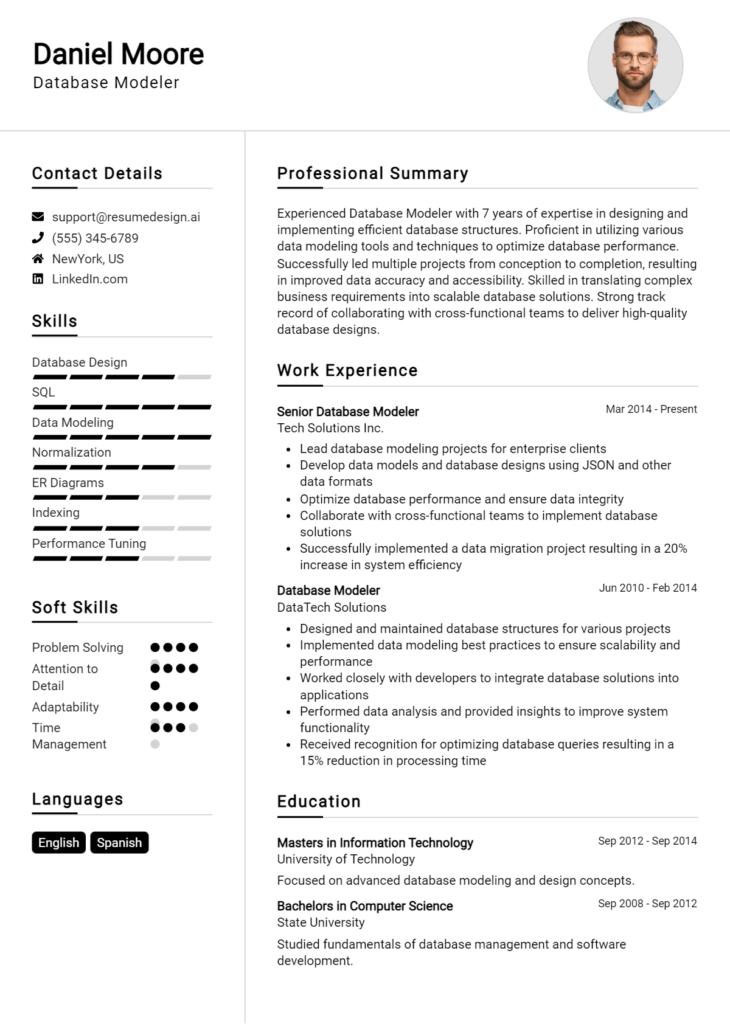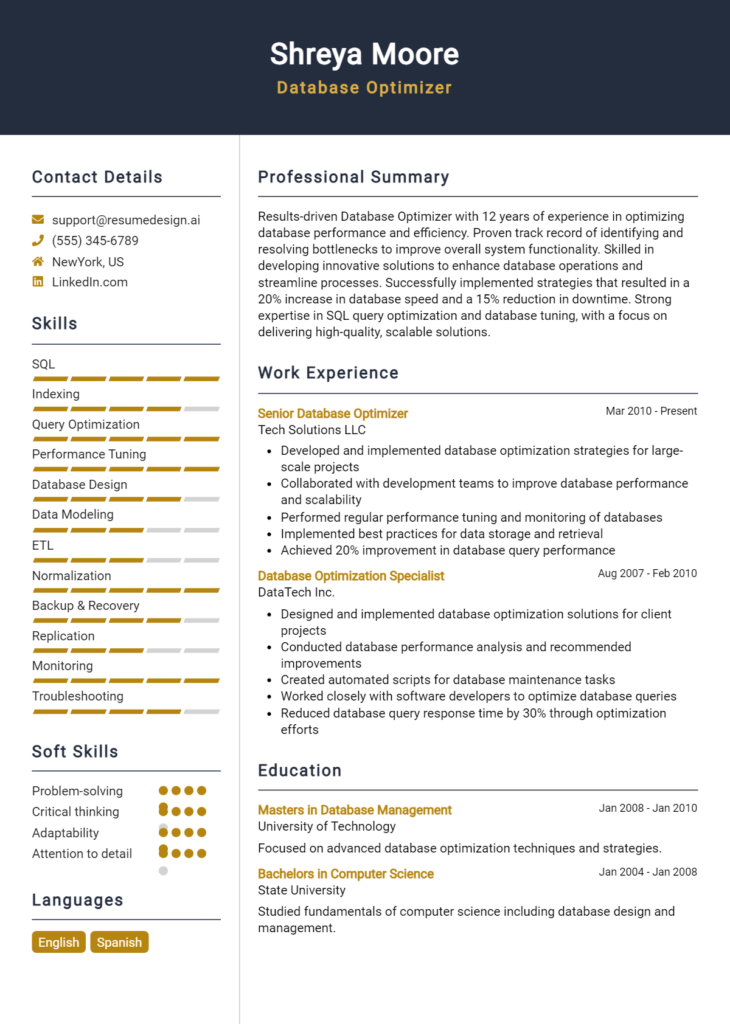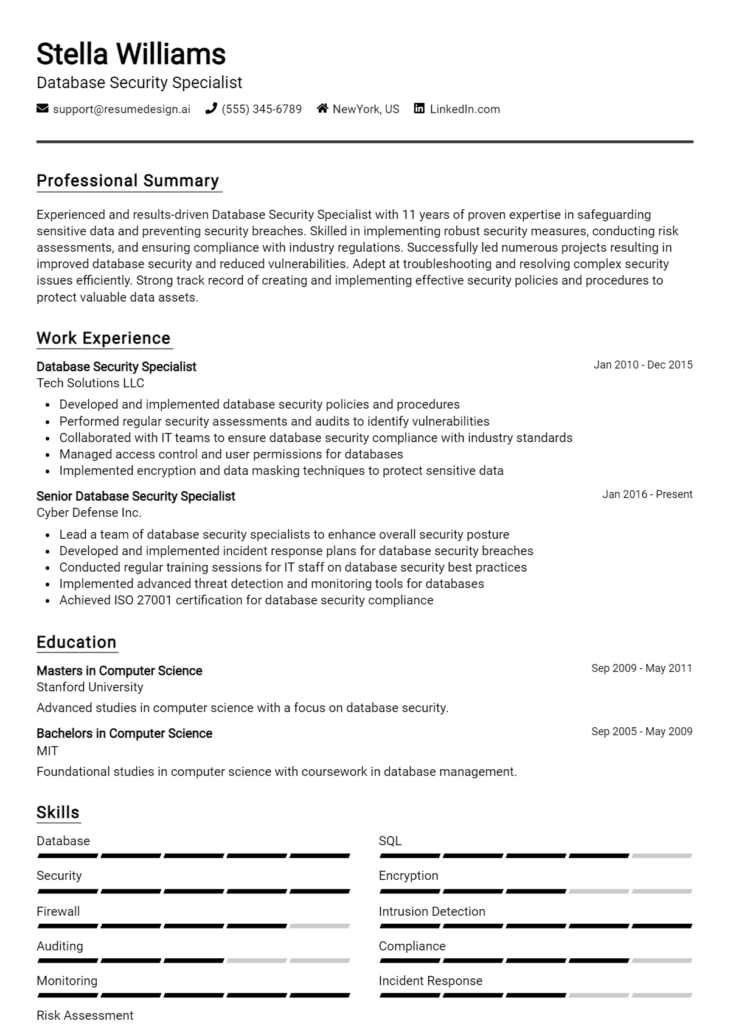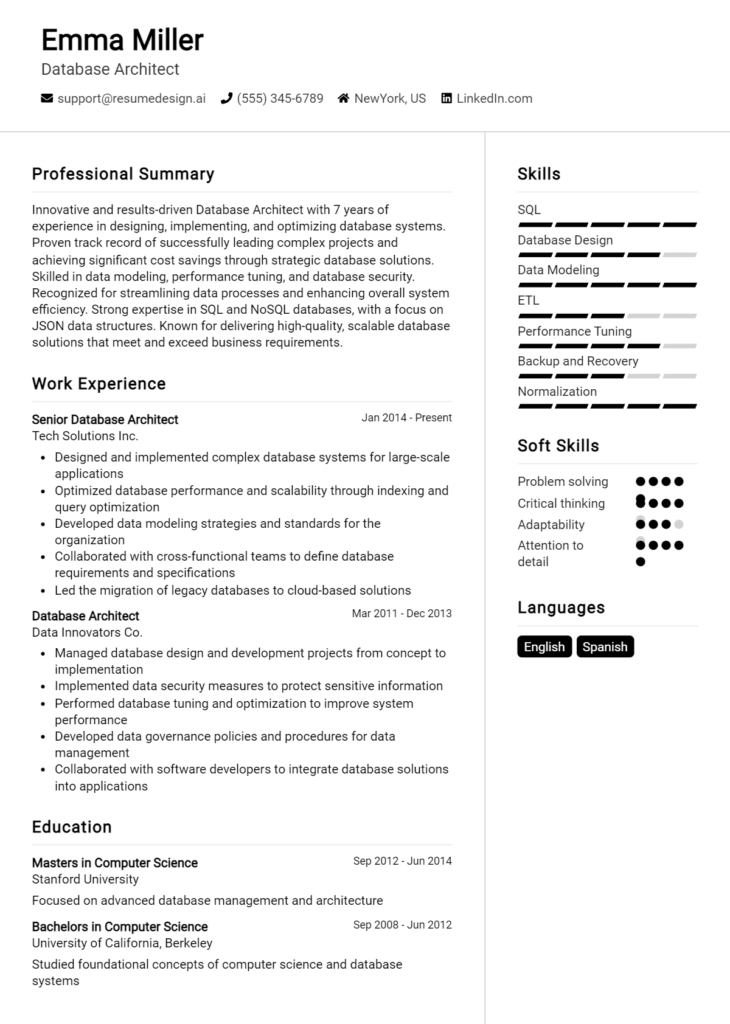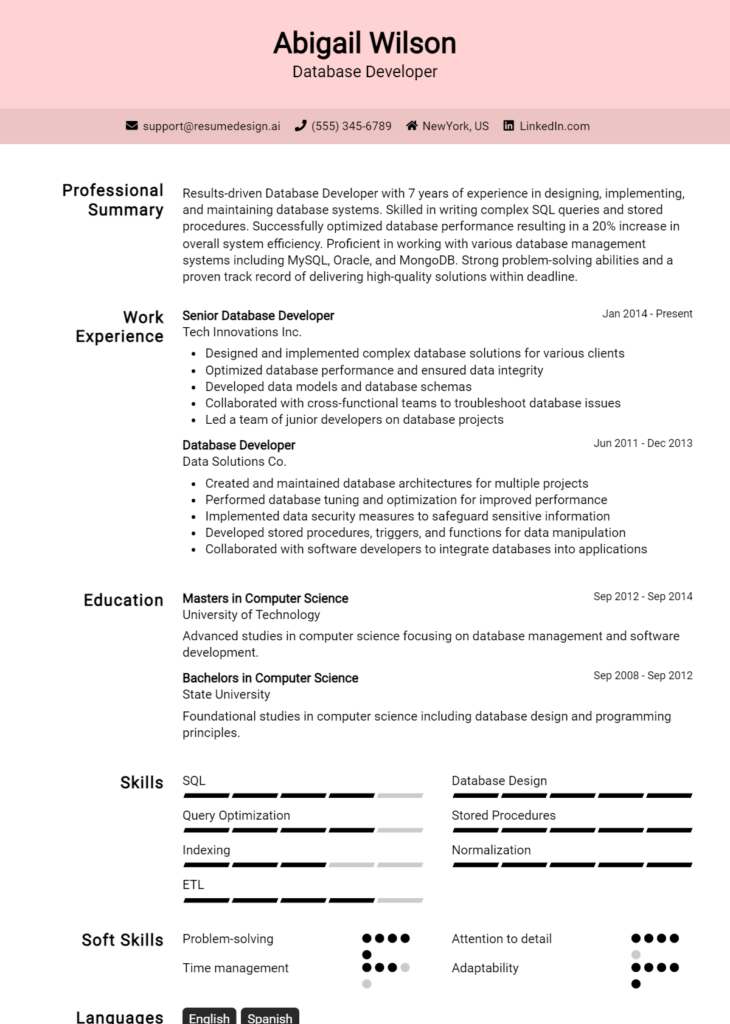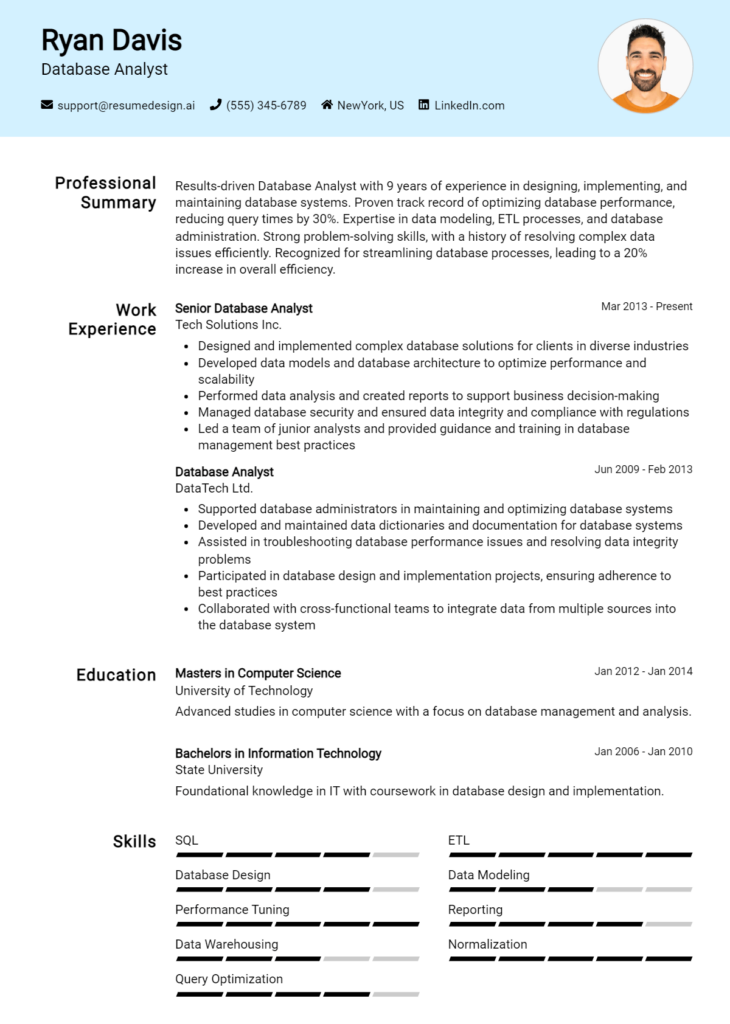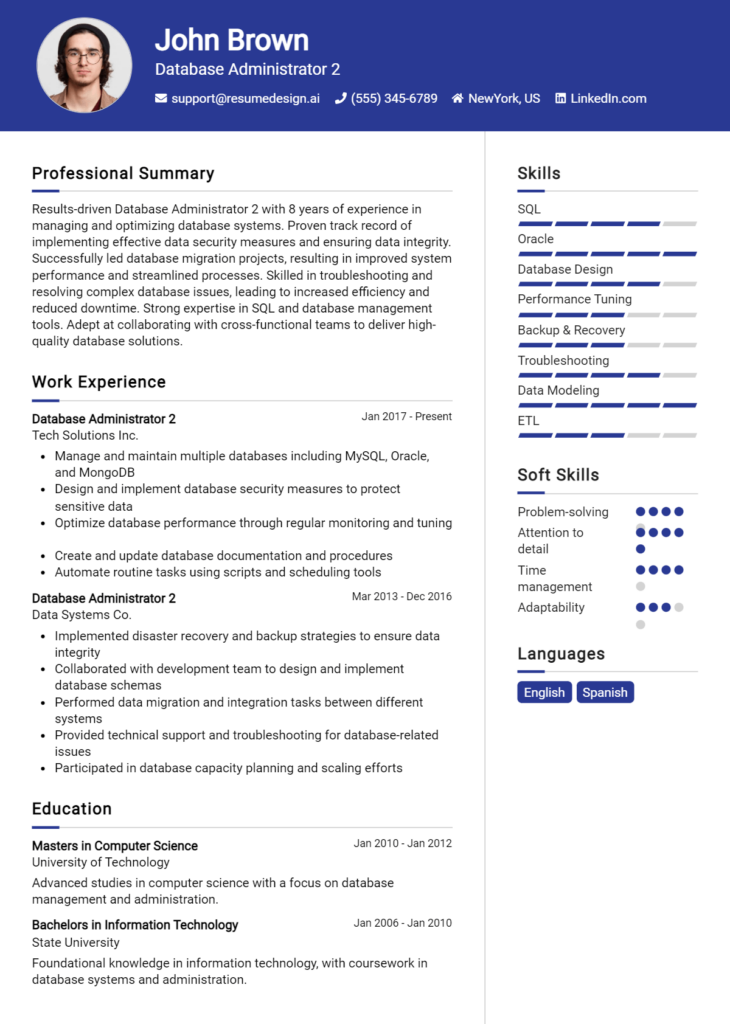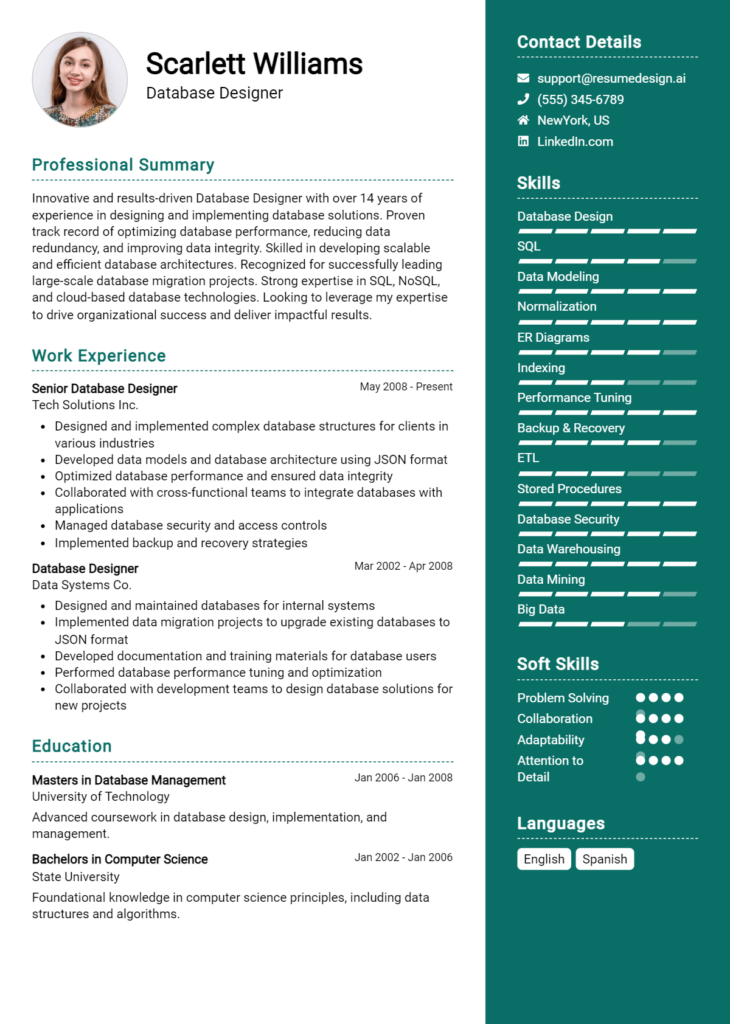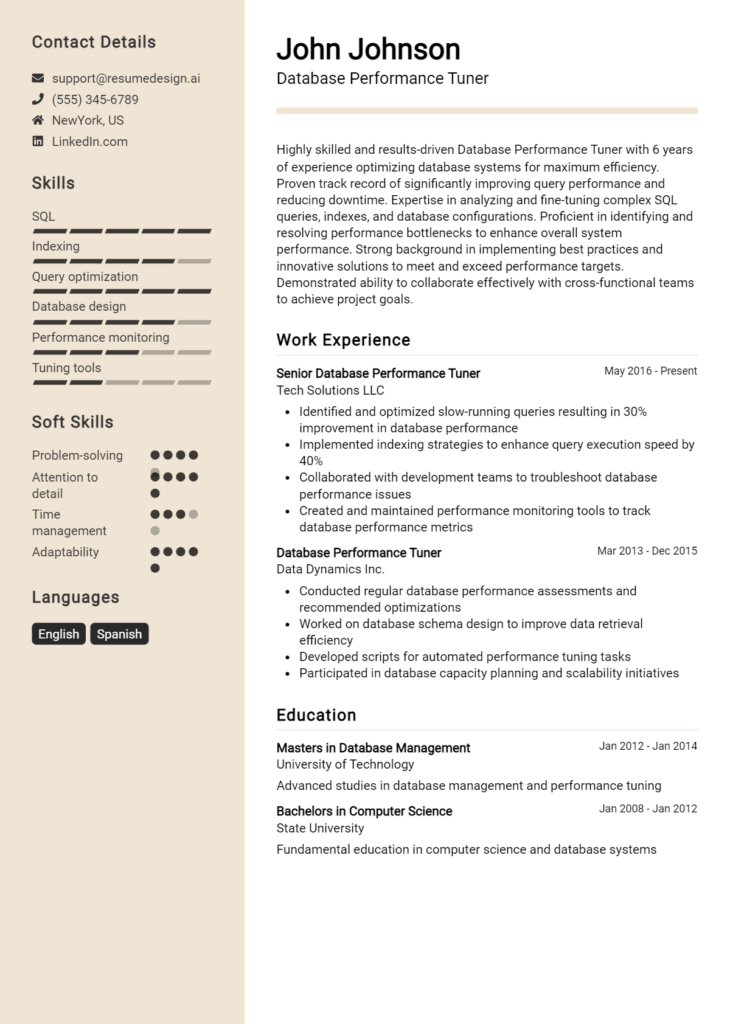Database Observability Engineer Core Responsibilities
A Database Observability Engineer plays a crucial role in monitoring, analyzing, and optimizing database performance across various departments, ensuring seamless data accessibility and integrity. This professional must possess strong technical skills in database management, operational expertise in system monitoring, and exceptional problem-solving abilities. By fostering collaboration between IT and business units, they help align technical initiatives with organizational goals. A well-structured resume highlighting these competencies can significantly enhance career prospects in this evolving field.
Common Responsibilities Listed on Database Observability Engineer Resume
- Monitor database performance and health metrics to ensure optimal operation.
- Identify and troubleshoot performance bottlenecks and anomalies.
- Implement and maintain observability tools and frameworks.
- Collaborate with development and operations teams to optimize query performance.
- Design and execute database monitoring strategies and alerts.
- Analyze database logs to identify trends and proactive measures.
- Document processes and create standard operating procedures for observability.
- Conduct capacity planning and resource allocation assessments.
- Ensure data security and compliance through monitoring practices.
- Provide training and support to team members on observability tools.
- Participate in incident response and post-mortem analysis for database issues.
- Stay updated with industry trends and best practices in database observability.
High-Level Resume Tips for Database Observability Engineer Professionals
In today's competitive job market, having a well-crafted resume is crucial for Database Observability Engineer professionals. Your resume is often the first impression a potential employer has of you, serving as a powerful tool to showcase your skills, experience, and achievements in a concise and compelling manner. A well-designed resume not only highlights your technical expertise but also communicates your understanding of the industry's unique demands. This guide will provide practical and actionable resume tips specifically tailored for Database Observability Engineer professionals, ensuring that your application stands out in a crowded field.
Top Resume Tips for Database Observability Engineer Professionals
- Tailor your resume to the job description by incorporating relevant keywords and phrases that align with the specific requirements of the position.
- Highlight your experience with database monitoring tools and observability platforms, such as Prometheus, Grafana, or New Relic.
- Quantify your achievements by including metrics that demonstrate your impact on database performance and reliability, such as reduced downtime or improved query response times.
- Showcase your familiarity with various database technologies, including SQL and NoSQL databases, and any relevant certifications you hold.
- Include projects or case studies that illustrate your problem-solving skills in real-world scenarios related to database observability.
- Emphasize your ability to collaborate with cross-functional teams, highlighting experiences where your insights contributed to improved system performance.
- Keep your resume concise and focused, ideally one page, while ensuring it includes all critical information without unnecessary fluff.
- Use a clean, professional layout that enhances readability, making it easy for hiring managers to quickly identify your qualifications.
- Incorporate a summary statement at the top of your resume that encapsulates your expertise and career goals, tailored to the Database Observability Engineer role.
By implementing these tips, you can significantly increase your chances of landing a job in the Database Observability Engineer field. A focused and well-organized resume not only presents your qualifications effectively but also demonstrates your commitment to the role, making you a standout candidate to potential employers.
Why Resume Headlines & Titles are Important for Database Observability Engineer
In the competitive field of database observability, having a well-crafted resume headline or title is essential for distinguishing yourself from other candidates. A strong headline can immediately capture the attention of hiring managers, summarizing your key qualifications in a single, impactful phrase. This concise and relevant statement should directly relate to the Database Observability Engineer role, showcasing your expertise and unique value proposition. When done effectively, a powerful resume title not only highlights your competencies but also sets the tone for the rest of your application, compelling recruiters to delve deeper into your qualifications.
Best Practices for Crafting Resume Headlines for Database Observability Engineer
- Keep it concise: Aim for a headline that is no more than 10-12 words.
- Be role-specific: Tailor your headline to reflect the job title you are applying for.
- Highlight key skills: Include specific skills or competencies relevant to database observability.
- Use action-oriented language: Choose dynamic words that convey your accomplishments and impact.
- Include years of experience: If applicable, mention your years of experience to establish credibility.
- Make it compelling: Use impactful phrases that intrigue the reader and encourage them to read more.
- Avoid jargon: Ensure clarity by using language that is accessible to all readers, including HR personnel.
- Consider including metrics: If relevant, incorporate quantifiable achievements to enhance credibility.
Example Resume Headlines for Database Observability Engineer
Strong Resume Headlines
"Expert Database Observability Engineer with 5+ Years in Performance Optimization"
“Results-Driven Engineer Specializing in Real-Time Database Monitoring and Analysis”
“Skilled Database Observability Professional with Proven Track Record in Incident Response”
“Innovative Database Engineer Focused on Enhancing Data Integrity and Availability”
Weak Resume Headlines
“Engineer Looking for Job”
“Database Professional”
“Hardworking Individual”
The strong headlines are effective because they clearly communicate the candidate's expertise, experience, and unique value in a way that is specific and appealing to hiring managers. Each of these examples highlights relevant skills or accomplishments that directly relate to the Database Observability Engineer role. In contrast, the weak headlines fail to make an impact due to their vagueness and lack of specificity. They do not provide any insight into the candidate's qualifications or what sets them apart, making them easily overlooked in a sea of applications.
Writing an Exceptional Database Observability Engineer Resume Summary
In the competitive field of database observability engineering, a well-crafted resume summary serves as a critical first impression for job seekers. It quickly captures the attention of hiring managers by highlighting key skills, relevant experience, and notable accomplishments pertinent to the role. A strong summary is concise and impactful, tailored specifically to the job description, allowing candidates to stand out in a crowded applicant pool and effectively communicate their value from the outset.
Best Practices for Writing a Database Observability Engineer Resume Summary
- Quantify Achievements: Use specific metrics to demonstrate your impact, such as reduced downtime or improved query performance.
- Focus on Relevant Skills: Highlight key technical skills like SQL optimization, database monitoring tools, and troubleshooting techniques.
- Tailor the Summary: Customize your summary for each job application, aligning it with the job description and required qualifications.
- Be Concise: Aim for 3-5 sentences that clearly convey your experience and skills without unnecessary jargon.
- Showcase Technical Expertise: Mention specific technologies and methodologies you have worked with in database observability.
- Highlight Problem-Solving Abilities: Emphasize how you have identified and resolved database issues to improve performance.
- Use Action Verbs: Start sentences with dynamic verbs to convey initiative and results, such as "optimized," "implemented," or "monitored."
- Include Professional Development: Mention any relevant certifications or training that enhance your qualifications in the field.
Example Database Observability Engineer Resume Summaries
Strong Resume Summaries
Results-driven Database Observability Engineer with over 5 years of experience optimizing database performance and minimizing downtime. Successfully reduced average query response times by 40% through the implementation of advanced monitoring tools and proactive troubleshooting strategies.
Detail-oriented Database Observability Engineer skilled in using Prometheus and Grafana for real-time monitoring. Spearheaded a project that improved database availability by 30%, leading to a significant increase in user satisfaction and retention rates.
Experienced Database Observability Engineer with a solid background in cloud-based database solutions. Enhanced system reliability by 25% through rigorous performance analysis and the adoption of best practices in database management.
Weak Resume Summaries
Database Engineer with some experience in monitoring databases and improving performance. I work well with teams and have a good understanding of database systems.
Motivated professional seeking a Database Observability Engineer position. I have worked on various projects and am familiar with database technologies.
The examples of strong resume summaries are effective because they provide specific, quantifiable results and directly relate to the responsibilities of a Database Observability Engineer. They highlight relevant skills and demonstrate a clear impact on previous projects. In contrast, the weak summaries are vague and lack measurable outcomes, making it difficult for hiring managers to gauge the candidate's true capabilities or the significance of their contributions in previous roles.
Work Experience Section for Database Observability Engineer Resume
The work experience section of a Database Observability Engineer resume is crucial as it serves as a platform to demonstrate the candidate's technical skills, leadership capabilities, and the ability to deliver high-quality database products. This section allows candidates to present their practical experience in managing database systems, implementing observability tools, and ensuring optimal performance. By quantifying achievements and aligning their experience with industry standards, candidates can effectively showcase their value to potential employers, highlighting not only their technical expertise but also their contributions to team success and project outcomes.
Best Practices for Database Observability Engineer Work Experience
- Clearly outline your technical skills and tools used in each role, such as monitoring solutions, analytics platforms, and database management systems.
- Quantify achievements with specific metrics, such as percentage improvements in database performance or reductions in downtime.
- Highlight leadership roles and collaborative projects, emphasizing teamwork and cross-functional communication.
- Ensure that experience is relevant to the database observability field, drawing connections between past roles and the requirements of the job you are applying for.
- Use action verbs to emphasize contributions and impact, showcasing initiative and results-driven work.
- Include any certifications or relevant training that enhances your qualifications and expertise in database observability.
- Tailor your work experience to reflect the needs of the specific job description, utilizing keywords that resonate with industry standards.
- Maintain a concise and organized format, making it easy for hiring managers to quickly assess your qualifications.
Example Work Experiences for Database Observability Engineer
Strong Experiences
- Led a team of 5 engineers to implement a comprehensive database monitoring solution that improved query performance by 40% and reduced incident response time by 30%.
- Developed and deployed a real-time observability framework across multiple database environments, resulting in a 25% decrease in downtime and enhancing proactive issue resolution.
- Collaborated with cross-functional teams to design and execute a data analytics strategy that increased data retrieval speeds by 50%, significantly improving user experience.
- Managed the migration of legacy database systems to cloud-based solutions, achieving a 35% reduction in operational costs while enhancing scalability and reliability.
Weak Experiences
- Worked on database projects to help improve performance.
- Participated in team meetings to discuss database issues.
- Assisted colleagues with database-related tasks as needed.
- Maintained database systems with occasional updates and fixes.
The examples of strong experiences are considered effective because they provide specific, quantifiable outcomes and demonstrate clear leadership and collaboration, showcasing the candidate's direct impact on their organization's database performance. In contrast, the weak experiences lack detail and specificity, making them less impressive to potential employers, as they do not clearly articulate the candidate's contributions or achievements.
Education and Certifications Section for Database Observability Engineer Resume
The education and certifications section of a Database Observability Engineer resume is crucial for showcasing a candidate's academic background and industry-relevant credentials. This section not only highlights degrees and certifications but also reflects a commitment to continuous learning and professional development in the fast-evolving field of database management. By including relevant coursework, specialized training, and recognized certifications, candidates can significantly enhance their credibility and demonstrate alignment with the requirements of the Database Observability Engineer role, making them more attractive to potential employers.
Best Practices for Database Observability Engineer Education and Certifications
- Focus on relevant degrees such as Computer Science, Information Technology, or Data Engineering.
- List industry-recognized certifications such as Certified Database Administrator (CDBA) or AWS Certified Database Specialty.
- Include specialized training in observability tools and database performance management.
- Provide detailed information about relevant coursework that pertains to database systems and observability techniques.
- Highlight any ongoing education or professional development courses to showcase continuous learning.
- Use clear formatting to ensure easy readability and accessibility of information.
- Prioritize certifications that are current and recognized within the industry.
- Consider including participation in relevant workshops or conferences to further illustrate expertise.
Example Education and Certifications for Database Observability Engineer
Strong Examples
- Bachelor of Science in Computer Science, XYZ University, Graduated 2021
- AWS Certified Database Specialty, Issued June 2023
- Certified Database Administrator (CDBA), Issued March 2022
- Relevant Coursework: Database Management Systems, Data Warehousing, and Observability Techniques
Weak Examples
- Associate Degree in Culinary Arts, ABC Community College, Graduated 2020
- Microsoft Office Specialist Certification, Issued 2019
- High School Diploma, Graduated 2018
- Basic SQL Course, Completed 2017 (Outdated)
The strong examples listed above are considered relevant because they align directly with the skills and knowledge required for a Database Observability Engineer role. They feature degrees and certifications that enhance the candidate's expertise in database management and observability practices. In contrast, the weak examples demonstrate a lack of relevance to the position. They include unrelated degrees, outdated certifications, and skills that do not contribute to the specialization required for success in the field of database observability engineering.
Top Skills & Keywords for Database Observability Engineer Resume
In the rapidly evolving field of database management, the role of a Database Observability Engineer has gained prominence as organizations increasingly rely on data-driven decision-making. A well-crafted resume that highlights relevant skills can significantly enhance a candidate's chances of landing an interview. Demonstrating both hard and soft skills tailored to the specific requirements of the job is crucial. The right combination of technical expertise and interpersonal abilities not only showcases a candidate's qualifications but also reflects their potential to thrive in a collaborative and dynamic work environment. To further explore essential skills for this role, consider the following lists of hard and soft skills.
Top Hard & Soft Skills for Database Observability Engineer
Soft Skills
- Strong analytical thinking
- Excellent problem-solving abilities
- Effective communication skills
- Team collaboration
- Attention to detail
- Adaptability to changing technologies
- Time management
- Critical thinking
- Customer-focused mindset
- Conflict resolution
Hard Skills
- Proficiency in SQL and NoSQL databases
- Expertise in database performance monitoring tools
- Experience with observability platforms (e.g., Prometheus, Grafana)
- Knowledge of data modeling and database design
- Familiarity with cloud technologies (e.g., AWS, Azure, GCP)
- Understanding of data governance and compliance
- Scripting skills (e.g., Python, Bash)
- Experience with incident management and troubleshooting
- Ability to analyze and visualize database metrics
- Familiarity with containerization and orchestration tools (e.g., Docker, Kubernetes)
By incorporating these skills into your resume, along with relevant work experience, you can create a compelling narrative that demonstrates your qualifications for the Database Observability Engineer position.
Stand Out with a Winning Database Observability Engineer Cover Letter
Dear [Hiring Manager's Name],
I am writing to express my interest in the Database Observability Engineer position at [Company Name], as advertised on [where you found the job listing]. With a strong background in database management, performance tuning, and observability tools, I am excited about the opportunity to contribute to your team and enhance the reliability and performance of your database systems. My experience in implementing observability practices aligns well with your organization’s goal of ensuring optimal database performance and uptime.
In my previous role at [Previous Company Name], I successfully led initiatives to implement monitoring solutions that provided real-time insights into database performance. This involved deploying observability tools such as Prometheus and Grafana, which allowed us to proactively identify and resolve performance bottlenecks. By collaborating closely with development and operations teams, I facilitated a culture of continuous improvement and ensured that our database systems were not only robust but also resilient under peak loads. My ability to analyze performance metrics and translate them into actionable insights helped reduce downtime by 30% and improved overall system efficiency.
I am particularly drawn to this position at [Company Name] due to your commitment to innovation and excellence in database management. I am eager to bring my skills in data visualization, incident response, and performance optimization to your team. Furthermore, my passion for leveraging cutting-edge technologies and methodologies to enhance database observability will enable me to make a meaningful impact on your operations. I am excited about the possibility of contributing to [Company Name] and collaborating with talented professionals who share my dedication to database excellence.
Thank you for considering my application. I look forward to the opportunity to discuss how my background, skills, and enthusiasms align with the needs of your team. I am eager to explore how I can help [Company Name] achieve its database performance goals and contribute to its success.
Sincerely,
[Your Name]
[Your LinkedIn Profile] (if applicable)
[Your Contact Information]
Common Mistakes to Avoid in a Database Observability Engineer Resume
When crafting a resume for a Database Observability Engineer role, it's essential to present your skills and experiences in a clear and impactful manner. However, many candidates make common mistakes that can undermine their chances of landing an interview. Avoiding these pitfalls can significantly enhance the effectiveness of your resume and better showcase your qualifications to potential employers.
Vague Job Descriptions: Failing to provide specific details about your previous roles can leave hiring managers unsure of your actual responsibilities and achievements. Use clear, quantifiable metrics when possible.
Ignoring Relevant Skills: Not highlighting technical skills relevant to database observability, such as monitoring tools (like Prometheus or Grafana), SQL proficiency, or cloud technologies, can make your resume less competitive.
Lack of Keywords: Many companies use applicant tracking systems (ATS) to filter resumes. Not including relevant keywords from the job description can result in your resume being overlooked.
Overemphasizing Soft Skills: While soft skills are important, a resume for a technical position needs to prioritize technical competencies and experience. Balance is key.
Neglecting Professional Development: Failing to mention certifications, training, or ongoing education related to database management or observability can suggest a lack of commitment to professional growth.
Using Passive Language: Resumes that rely on passive phrases may come across as less impactful. Use strong action verbs to convey your achievements and contributions more effectively.
Formatting Issues: A cluttered or unprofessional format can distract from your qualifications. Ensure your resume is visually appealing, easy to read, and well-organized.
Not Tailoring the Resume: Sending the same generic resume for every application can be detrimental. Tailoring your resume to each specific job description shows genuine interest and attention to detail.
Conclusion
As we explored the vital role of a Database Observability Engineer, we highlighted the importance of having a solid understanding of databases, monitoring tools, and data-driven decision-making. The key responsibilities include ensuring database performance, diagnosing issues, and implementing observability practices to enhance reliability and efficiency.
We also discussed the technical skills required, such as proficiency in SQL, familiarity with cloud platforms, and experience with observability tools like Grafana and Prometheus. Additionally, soft skills like problem-solving, communication, and teamwork are crucial for success in this role.
In conclusion, if you're looking to advance your career as a Database Observability Engineer, it's essential to keep your resume up-to-date and tailored to reflect your skills and accomplishments in this field. We encourage you to take the time to review your resume and enhance it with the latest tools available. Check out resources such as resume templates, a comprehensive resume builder, insightful resume examples, and tailored cover letter templates to ensure you stand out in the competitive job market.

